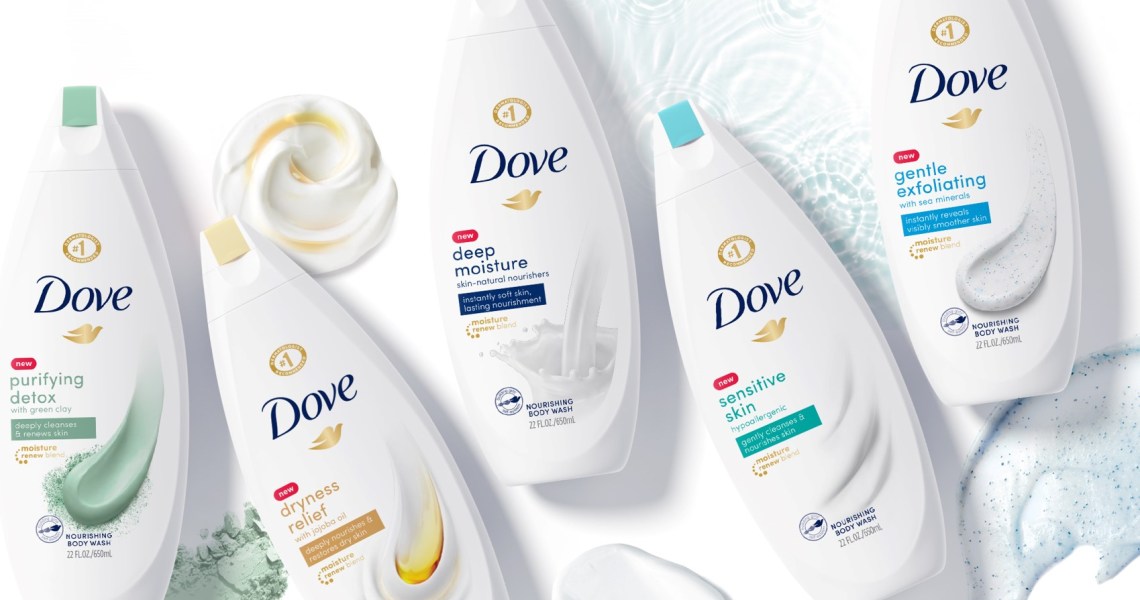The conversations around skin barrier and dermatology have increased in recent years, but the microbiome, made up of microorganisms on the skin’s surface, is only beginning to be understood.
Unilever, which owns a powerful portfolio of brands including Dove, Vaseline, Murad and Tatcha, has been researching the skin’s microbiome for 15 years. The skin microbiome, a complex environment of microorganisms that sit on the surface of the skin across multiple zones on the body, communicates between the bacteria, skin cells and immune cells. That communication enforces the protective barrier function that the skin has and helps against infection, and can even protect against skin allergies, acne and eczema. With its suite of skin-care brands, Unilever is hoping its scientific and AI-assisted research into the microbiome will solve skin-care issues like acne.
“We can see quite a staircase of benefits in claims that you can take the consumer up over time, and especially as they get used to the fact that microbiome is no longer just a buzzword like it is now, but [rather] a route that can be applied to understanding skin concerns,” said Dr. Jason Harcup, R&D head of skin care and the prestige range at Unilever.
Unilever has been working with a team of researchers, PhD students and industry networks to collect over 12,000 microbiome samples across hundreds of clinical studies conducted across the world, generating over 12 terabytes of microbiome data. The data collection aspect is incredibly important, as one’s environment and interactions can affect a person’s microbiome. The data collection has been greatly accelerated by how fast the data can be cross-checked and counted through the help of artificial intelligence, which Unilever added in 2021, to sequence and decipher huge amounts of data.
Collecting varied geographical samples from India, China and the U.S. allows for a better understanding of how the microbiome works and what products can be created to cover the core elements in the microbiome that can be shared across populations. Factors that can change one’s microbiome include pollution, evolutionary dispositions, skin conditions and life stages. For example, according to Unilever researchers, measuring a microbiome can show whether someone is menopausal within an 80% degree of accuracy.
The company has used its growing research to begin creating a whole suite of products across its prestige and mass brands focused on rebuilding, maintaining and supporting the skin microbiome. Dove’s Deep Moisture Body Wash, for example, launched in 2019 and is proven, through peer-reviewed studies, to cause less change in the microbiome than traditional soaps. The ceramide technology in the product helps the skin to create over 100 ceramides. That’s rather than applying ceramides topically, which other beauty brands have done. Unilever’s other product launches include Vaseline’s new Microbiome Care lotion, a prebiotic-enriched formulation that restores microbiome strength and resilience and boosts the levels of key helpful microbes. Within Unilever’s hair products, Living Proof Dry Scalp Treatment, launched in 2019, acts as a traditional anti-dandruff shampoo that also rebalances the microbiome. And within prestige, Tatcha debuted its Indigo Skin Repair in 2021; it uses Japanese indigo and ceramides to rebuild the skin barrier.
Key areas that will be reconsidered as the research becomes more mainstream include Unilever’s acne products. “Acne is going to go through a little bit of reconsideration. History has always judged the acne bacteria as being the bad guy and the culprit,” said Dr. Harcup. He noted that this won’t be the case as skin care development learns to target and work with specific microbes to improve skin condition.
Ad position: web_incontent_pos1
Dr. Samantha Samaras, beauty and wellbeing R&D head of science and technology at Unilever, agreed. “The first misconception is that the microbiome is static and that there are ‘bad bugs’ and ‘good bugs,’ and that you just need to go in and kill the bad bugs and everything will be OK, when actually they’re incredibly complex living environments,” she said.
With skin barrier disruption and recovery a hot topic in current beauty trends, especially among the Gen-Z group, the time for learning and developing new products in skin-care R&D is now. Certifications like the ones offered by advisory certification council Kind to Biome are becoming more important for showing which products are not disturbing the skin barrier and which products can say that they’re using active probiotics and prebiotics in their ranges.
“Perhaps the biggest myth today is that the use of probiotics in skin-care products could be beneficial to your skin. In most products, it’s simply impossible because the living organisms in the probiotics can simply not survive in products without smart packaging solutions so they arrive intact on your skin,” said David Koo Hjalmarsson, co-founder of the Kind to Biome certification standard. Tula, for instance, is a brand that underscores its use of probiotic extracts.
New brands like Dr. Whitney’s Bowe Beauty and Shielded Beauty are making the microbiome the core focus of their product ranges. And Unilever researchers are seeing how at-home skin analytics and testing similar to 23andMe could soon come for the skin microbiome. as well. That would mean customers could go to their skin-care brands and tell them which products they need, based on the needs of their microbiome and the bacteria that is present on their skin.
The benefits of the microbiome have also been linked to human health and mood. “It’s not just about what it can mean for the benefits we’re looking for in skin care, but now it’s also this exploding area of broader human health and the link between the brain and the skin and the gut,” said Dr. Samaras. “It’s an area that, by leaning into it, we can move beyond the benefits that we see, in terms of acne and the odor control barrier, and into the more holistic wellbeing benefits around mood,” she said.




